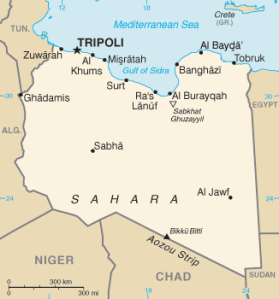
The Libyan uprising ousted Muammar Gaddafi. A government was put in place in the capital and it looked like democracy had arrived for good. Instead what followed was a breakdown of order and descent into civil war. Now after months of conflict the European Union hailed an agreement on Friday between rival factions to form a unity government. But what does this mean in reality?
A unity government will face the same problems any person or persons seeking to govern the country would face: societal division along tribal lines. Tribal allegiances still exert a significant influence on modern politics in Libya, a murky network of different factions that must be navigated carefully in order to rule.
Like so many other countries in Africa and the Middle East that have experienced conflict in the last 20 years, Libya does not have a long history of being controlled by a nationally-recognised central government. A brief look at its history shows how far those signing Friday’s agreement have yet to come.

Map of Libya showing major cities of Tripoli and Benghazi, as well as key oil town Ra’s Lanuf
After its independence in 1951, Libya was ruled by a monarchy and became very wealthy after the discovery of oil in 1959. However, even under one leader, the country was not stable. King Idris’ position was weakened by his advanced age and lack of a male heir. Furthermore, while his “fundamentalist Muslim piety” secured him the loyalty of the Bedouin, it put him at odds with more modern intellectual trends in other circles. Also, to maintain order, he was forced to alternate the country’s capital city between Benghazi and Tripoli every two years to appease two rival regions of Libya. The king was eventually overthrown in 1969 by a group of military officers. Their leader? One Captain (later Colonel) Gaddafi.
Gaddafi’s approach to tribal politics was inconsistent. While on the one hand he sought to reduce tribal influence in society, much of his time as leader was spent securing the allegiances and support of tribal leaders, whether through marital ties or the threat of punishment (pdf). Indeed Gaddafi surrounded himself with members of his own Qadhadhfha tribe, which at once secured his position and alienated other tribal groups.
Gaddafi had declared Libya a republic, but the society he formed through his dealings with the tribes was one of patronage. Those who served well benefitted from high status and material reward while opponents received harsh treatment. In this regard it is hard to differentiate between the Gaddafi system and a monarchical court. Tribalism, then, was a fundamental part of the state under the Gaddafi regime.
When the Arab Spring hit Libya collapsed into civil war. From the outside it looked like an organised rebel army marshalling its war effort from a central base in Benghazi. After the fall of Gaddafi’s compound in Tripoli, however, it became clear that a large part of this apparent unity was purely a result of a shared hatred of the colonel. Once the regime was no more the new government swiftly found its power waning. Rival militia began to claim areas of the capital for their own, clashing violently in the streets. The struggle between secular and Islamist armed groups rose to the forefront of political discourse in Libya.
While the politics of post-revolution Libya was certainly affected by this struggle between Islamism and more modern, secular beliefs, Libyan society cannot be split solely along those lines. The execution of Gaddafi did not spell the end for tribal involvement in politics. Regardless of whether the EU-backed resolution for a unity government succeeds, Libyan politics will still feel the pull of tribal allegiances.
Even with the ceasefire and resolution, a stable, publicly recognised government in Libya is still a long way off. A long term accord, or at least a substantial resolve to cooperate, among the major tribes will be necessary for that government to function with any real purpose. Centralised power is alien to many African and Middle Eastern states, with societies often run as a series of loosely connected provinces.
It is this fragmented, decentralised distribution of power that limits the development of the sort of national identity that feels natural to residents of western countries. Libyans “never looked at themselves as Libyans. Being a Muslim came first, belonging to a tribe second, and being Libyan came last” (Global Security). Without that national identity, any government will have no choice but to attempt to rule within the same constraints that Muammar Gaddafi and King Idris operated under.
CC Image “Heavy Gunfire Erupts in Tripoli” courtesy of Surlan Soosay, Flickr.
January 21st, 2015 → 9:49 pm
[…] by Kameniev [link] […]